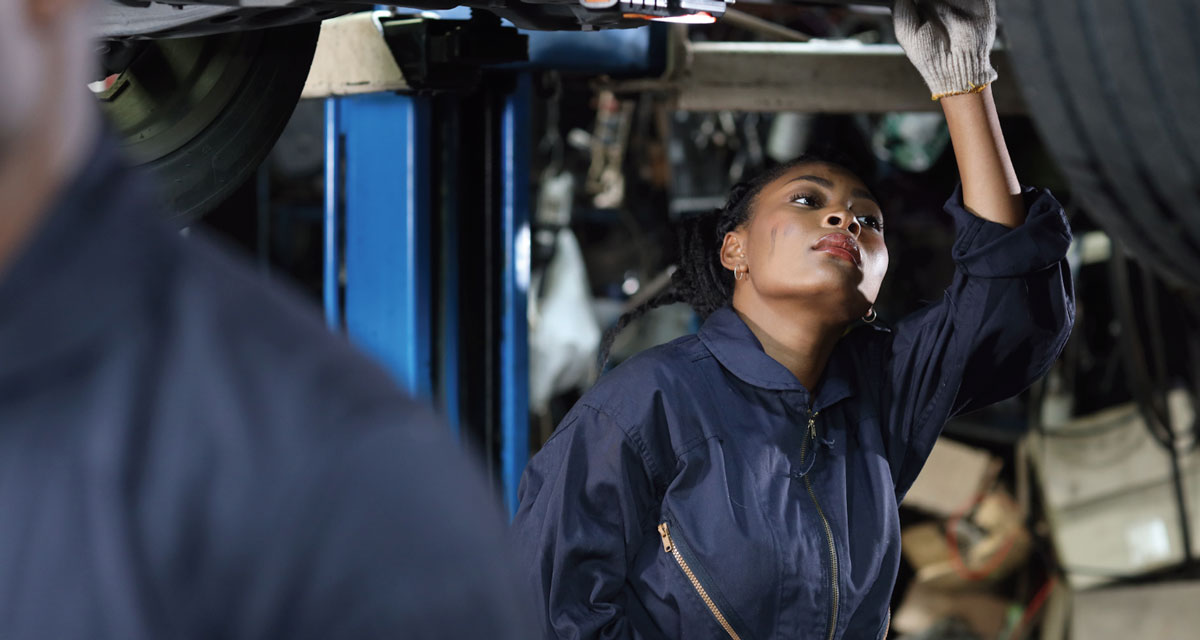Canadian auto dealer columnist Wolfgang Koehler shares what female techs told him about what it’s like being a woman in our industry. We can do better.
In the previous issue, I wrote about a personal account of a female service technician I hired many years ago.
As it turns out, she didn’t have a comfortable experience in the shop, and left the industry, which was a real shame.
In this issue, I have another story to share from a different dealership and another wonderfully talented technician. So is gender bias still happening today? Let’s find out. I did not change this person’s story to ensure its authenticity.
“My desire to become a mechanic began with an interest in the work itself. The trade spoke to my interests and natural skill set and it was for this reason that I started down the path of becoming a licensed mechanic. In the beginning, the furthest thing from my mind was what it would mean to be a woman in a male dominated field.
“It never crossed my mind that this may pose issues for me, and I certainly never thought that being a woman in the field would be an important factor in my career goals and path. It is only now, with hindsight, that I can say that at the start I was a little bit naive.
“It didn’t take long for me to realize that my gender was going to be a barrier. Shortly after starting my apprenticeship and getting one of my first jobs in the trade it became clear that being a woman would play a profound role in how my work was perceived and recognized. Most people think the issue is outright discrimination, and don’t get me wrong that happened too, but the bigger barrier was the implicit bias. The unconscious ideals that came from even my closest friends and from the many men in the trade that will say ‘I believe women can do the job.’
“Listen closely to that statement. At first you might question why this creates an issue. The underlying perception of this statement is that ‘some women can do a man’s job’ or ‘I believe women can do men’s work’ but you are still associating this work with men.
“I was seen as an exception to the rule and the job was still perceived as a man’s role. This meant I was only recognized and respected for being a woman that could do things like a man. This perception made it impossible for me to be respected and recognized for my actual skills, abilities and what I could uniquely bring to the role.
“The first thing I started to notice is how often people would come up and point it out to me. Sometimes the comments were well intentioned but still highlighted the issue such as, ‘Wow, good for you!’” (wow you’re a woman doing a job that only men can do, good for you).
“Other times it would be comments about how this isn’t a job for a woman
“‘You shouldn’t be getting greasy and dirty; that’s a man’s job.’ When I first started and got comment after comment, I thought to myself: ‘Really? Does this actually matter? People actually see me as a woman doing a man’s job and not just as a mechanic?’
“In the beginning, this motivated me and made me want to rise to the challenge and show that my gender doesn’t matter, I can do the job just the same. I thought by working hard I could change this perception. Over the years I found that trying to prove myself and gain the same respect that my co-workers got right off the bat even as new mechanics simply because they were men was impossible.
“It started with the feelings of hopelessness (no matter what I do it’s not enough) and then turned to frustration. Eventually I realized that I could not change the perception of others by doing an incredible job because of how people perceive their surroundings, and their bias can only be changed by them.
“When you are looked at through the lens of a woman doing a man’s job, it skews all perception of your work. You are not measured on your ability to do the job but rather on how you are able to put up with an environment made for men.
“Most of the respect I could find was that I could ‘keep up’ with the men or be in a harsh ‘manly’ environment without being too ‘sensitive’ or getting offended, and that was what I got praise and recognition for, not for my actual skills or competencies.
“When your co-workers, managers and peers all hold the same perspective it makes it impossible to receive the same treatment. Throw in the more blatant sexism where people wouldn’t even look me in the eyes when I would speak or wouldn’t even acknowledge that I had given an opinion or direction on a job.
“I remember one time I was sent to a customer’s house to look at their car in their driveway as a fully-licensed mechanic and was given an apprentice to assist me. While I was talking to the customer and answering his questions, he would only look at the apprentice and would direct all questions to him and I had to answer them and speak to the side of his head while he didn’t even acknowledge I was there.
“The key to allowing women to be able to not just survive in the trade and its environment but thrive is shifting the mind set and preconception that they are not as capable or able to do the job.”
“When it came to gaining the respect of my superiors and managers I had to work twice as hard, and it still wasn’t the same respect that my co-workers got. I was constantly dismissed when giving my opinions on my own jobs and the direction I would like to take.
“I was consistently made to go in opposite directions than what I felt was a necessary next step in my diagnosis. I found that I was having to put in twice as much effort to gain the same number of hours as my co-workers just from the number of times I would be sent off in other directions, questioned about my work or not allowed or trusted to do my own diagnosis process. I was also constantly given the jobs others did not want to do.
“I had managers, customers, co-workers asking if I was capable of doing the jobs or able to do the same jobs as the other mechanics even though I had proven my abilities time and time again. I was almost never looked at as someone who was knowledgeable or could give advice or input. If I was talking to another mechanic in the shop, it was the automatic assumption that they were helping me and not the other way around.
“After about seven years of working at the same shop with little to no improvement on these issues, it became exhausting to put in twice as much effort for less respect and less recognition.
“No matter how well I performed I was always seen as just being able to keep up with the men. In reality, when the cold hard numbers were pulled it showed conclusively that I was a very skilled and methodical mechanic who if I were a man would be looked at as a top performer in the shop.
“In the end I burnt out. My mental health struggled. My self-worth struggled. My confidence struggled. The final nail in the coffin for my career as a mechanic was when after working at the same place for nine years, with not a single recorded mistake, producing as many hours as the other mechanics and having an extremely high standard and quality of work, I found out I was making significantly less money than mechanics that had been there significantly less time than me, had more mistakes, produced less hours and had a lower quality of work.
“When I asked my manager about this, and reviewed the facts and statistics regarding my work, they had no answer. They could not explain the discrepancy in pay or recognition.
“A week later my manager came to me with a smile and said we reassessed and took in what you said, he handed me an envelope and it was a one dollar raise, this would still keep my pay several dollars below any other mechanic in the shop. That was when I realized the perspective would never change, that they could not see past the narrative that I was a woman just keeping up with the men, even when presented with cold hard facts.
“So, I made the decision after 10 years to leave the trade, not because I didn’t enjoy the work or even enjoy my co-workers or peers but solely because I was exhausted and run down from the inability to change the outlook and the bias.
“The key to allowing women to be able to not just survive in the trade and its environment but thrive is shifting the mind set and preconception that they are not as capable or able to do the job. That certain work is for men and while some women can do it, they are the exception.
“The mindset that has people saying or thinking things like ‘good for you for being able to keep up with the men’ is the problem, because then all anyone sees is you just keeping up, even if you are excelling.
“And at the end of the day this mindset and mentality becomes a self-fulfilling prophecy because the environment is so mentally taxing and that much more challenging for a woman in the trade that they end up not being able to succeed, or as able to excel or be able to do their job to the best of their abilities.
“It’s about actively breaking down that thought process and the biases every day, because they do not come from facts or truth — they come from bias that we are socialized into starting from the moment we are born.
“The idea that there are biological or genetic differences that make men better at the trade and women less capable is factually not true — no study ever has proven this. The barrier is the implicit bias that is so ingrained in people that they accept it as truth. Women are not being hated and pushed out of the trade. They are being slowly and quietly suffocated until it is no longer tolerable.”
You have now heard feedback from two female technicians who have left the industry. Two people who no longer work in an industry that struggles to find technicians.
The sad thing is that these women wanted to work on cars and were extremely good at it and left the industry. Even sadder still is like these women, there are other women out in our dealerships right now that have to fight every day to be in this industry.
They have a daily struggle to prove themselves and fight to take a seat at the table. Women in our industry are having to face challenges on a daily basis and are being overlooked despite their expertise because of their gender.
Imagine having to prove every single day that you have to prove your expertise, intelligence and capability just to be seen while others are accepted automatically without question because they are a man.
One of the techs said in closing: “I would ask the men in the industry to acknowledge their bias and actively try to learn and understand why this is their perspective. Ask themselves where this bias comes from and what it is based on, catch their thoughts and acknowledge them and actively try to break them down every day.”




















